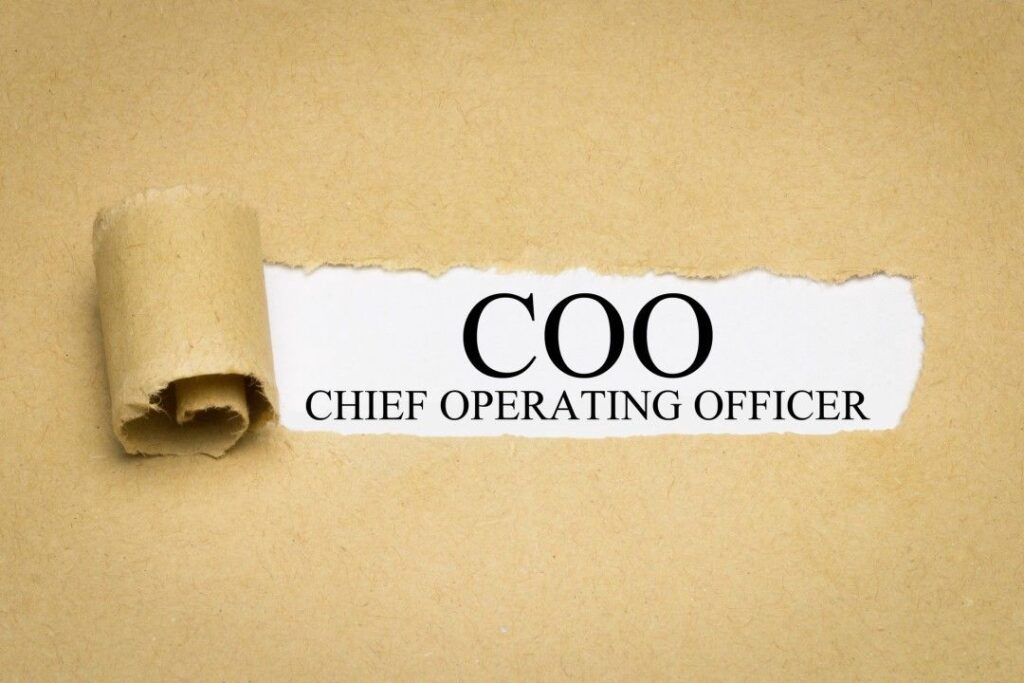Unveiling the role of a chief operating officer (COO)
The Chief Operating Officer (COO) is a critical executive overseeing an organization’s day-to-day operations. Acting as the second-in-command, the COO ensures that company operations align with the overall strategic goals set by the CEO and the board of directors. This role encompasses various responsibilities, from managing internal processes to driving efficiency and fostering a productive workplace culture. The COO’s influence extends across multiple departments, making it integral to the smooth and successful functioning of the business.
In this article, we will learn about the multifaceted role of the Chief Operating Officer (COO), exploring their responsibilities, the skills and qualifications needed for the job, and the various types of COOs across different sectors and industries.

Roles and responsibilities of a COO
The Chief Operating Officer (COO) plays a multifaceted role within an organization, shouldering various responsibilities critical to the business’s smooth functioning and success. The COO is primarily responsible for managing the company’s day-to-day operations, ensuring that all internal processes run efficiently and effectively.
Managing daily operations
One of the COO’s key responsibilities is overseeing the company’s daily operations. This involves ensuring that all departments function harmoniously, resources are allocated efficiently, and the organization’s operations align with strategic goals. The COO monitors performance metrics and implements operational improvements to enhance productivity and profitability.
Developing and implementing business strategies
The COO collaborates closely with the CEO and other executives to develop and implement business strategies. They translate the CEO’s vision into actionable plans, ensuring that these strategies are effectively communicated and executed across the organization. This includes setting operational goals, defining key performance indicators (KPIs), and ensuring the company meets its strategic objectives.
Overseeing departments and ensuring operational efficiency
A significant aspect of the COO’s role is to oversee various departments, such as finance, human resources, production, and sales. The COO ensures that these departments operate efficiently and are well-coordinated. They are responsible for streamlining processes, reducing costs, and improving overall operational efficiency to drive the company’s growth and success.
Leading and mentoring other executives and employees
Leadership and mentorship are crucial components of the COO’s responsibilities. The COO provides guidance and support to other executives and employees, fostering a culture of collaboration and continuous improvement. They mentor emerging leaders within the organization, helping to develop their skills and preparing them for future leadership roles.
Ensuring alignment with the company’s overall goals and objectives
The COO ensures that all operational activities align with the company’s overall goals and objectives. They create synergy between departments and functions, ensuring everyone is working towards the same strategic vision. This alignment is critical for achieving the company’s long-term success and maintaining a competitive edge in the market.
How do I become a COO?
To become a Chief Operating Officer (COO), companies often look for individuals with deep industry knowledge and extensive experience, typically gained through years in various roles within the same organization. The more exposure you have across departments and business functions, the more prepared you’ll be for the responsibilities of a COO.
Here’s a streamlined career path to becoming a COO:

Step 1: Earn a bachelor’s degree
A strong educational foundation in business is essential. Many COOs start with a bachelor’s degree in business management, which provides a solid understanding of key areas such as business strategy, finance, marketing, and leadership. This knowledge is critical for anyone aspiring to climb the corporate ladder toward executive roles like the COO.
Step 2: Seek out companies with growth opportunities
Gaining insights into every aspect of business operations is fundamental for a COO. Look for companies that offer pathways for cross-departmental experience, allowing you to work in various areas like production, research, finance, and marketing. Organizations that encourage internal mobility provide an ideal environment for gaining this well-rounded business knowledge.
Step 3: Develop management experience
Effective COOs adapt their communication style to suit the needs of individual team members. Start by taking on management roles where you can practice communication, team leadership, and project management. Building strong, collaborative relationships with your team is essential for developing the leadership skills a COO needs.
Step 4: Track your accomplishments
Throughout your career, document your contributions and achievements, especially those that impact operations, profits, or budgets. Companies look for a proven track record of managing profit and loss, increasing efficiencies, and implementing effective operational strategies. Keeping a record of these accomplishments will showcase your growth and the value you bring as a future COO.
Step 5: Pursue a Master’s degree
Earning an MBA or a master’s degree in management can be a strategic move for those aiming for COO roles. These programs offer advanced insights into business strategy, leadership, and communication, which are crucial for the responsibilities of a COO. A graduate degree can make you a stronger candidate for executive roles, setting you apart as you move up the ranks.
With these steps, you can position yourself for success on the path to becoming a COO, equipped with the skills, experience, and leadership qualities essential for this critical role.

Skills for a COO
The Chief Operating Officer (COO) role demands a unique blend of skills, which is crucial for managing the multifaceted responsibilities of the position. A successful COO must possess leadership abilities, strategic thinking, and in-depth industry knowledge to drive an organization’s operational success effectively.
Essential skills: leadership, strategic thinking, communication
Leadership is paramount for a COO, as they need to inspire and guide various teams toward achieving operational goals. Strategic thinking is also essential, enabling the COO to develop long-term plans that align with the company’s vision. Strong communication skills are necessary for effectively conveying strategies, fostering collaboration, and ensuring all stakeholders are on the same page.
Necessary certifications and professional development
Certifications in project management, operational management, and specific industry-related qualifications can enhance a COO’s credibility and expertise. Continuous professional development is vital for staying updated with industry trends, technologies, and best practices. Participation in executive training programs and workshops can also be beneficial.
Industry-specific knowledge and expertise
A deep understanding of the industry in which the company operates is crucial for a COO. This expertise allows them to make informed decisions, anticipate market trends, and navigate industry-specific challenges. Whether in finance, technology, healthcare, or manufacturing, the COO must be well-versed in the operational intricacies of their particular field.
Types of COOs
The role of a Chief Operating Officer (COO) can vary significantly depending on the organization’s size, industry, and specific needs. While the fundamental responsibilities remain consistent, the focus and scope of a COO’s duties can differ. Understanding the various types of COOs can provide insight into how this role adapts to different organizational contexts.
Executive COO
This COO focuses on high-level strategic planning and works closely with the CEO to develop and implement long-term business strategies. They are heavily involved in shaping the company’s direction and ensuring all departments align with overarching goals.
Administrative COO
This type of COO emphasizes internal administrative functions, such as human resources, legal, and compliance. They ensure the company’s internal operations run smoothly and adhere to all regulatory requirements.
Operational COO
The operational COO is primarily concerned with the efficiency and effectiveness of day-to-day operations. They focus on optimizing processes, improving productivity, and managing the supply chain and production activities.
Startup COO
The COO often wears multiple hats in startups, managing various functions from fundraising to product development. They help the company scale by establishing robust operational processes and building a solid organizational foundation.
Corporate COO
In large corporations, COOs may oversee specific business units or regions. Their role involves coordinating complex operations across multiple locations, ensuring consistency and efficiency on a larger scale.
Nonprofit COOs
In nonprofit organizations, COOs focus on optimizing resource use to achieve the organization’s mission. They manage operations, fundraising activities, and program implementation to maximize impact.
Examples of various COO roles in different sectors
Technology
In tech companies, COOs might focus on product development, innovation, and scaling operations rapidly to meet market demands.
Healthcare
Healthcare COOs oversee clinical operations, patient care services, and regulatory compliance, ensuring high-quality healthcare delivery.
Manufacturing
Manufacturing COOs are responsible for production efficiency, supply chain management, and quality standards.
Finance
In financial services, COOs manage risk, regulatory compliance, and operational processes to ensure stability and efficiency.
How to become a COO
Becoming a Chief Operating Officer (COO) is a rewarding but challenging journey that requires a blend of education, experience, and personal development. Here’s a step-by-step approach to navigating this career path:
Step 1: Education and learning
Most COOs start with a solid educational foundation in business management or a related field. Earning a bachelor’s degree in business administration, economics, or finance is typically essential. However, the quest for knowledge doesn’t stop there—many successful COOs also hold an MBA or other advanced degrees focusing on leadership and strategic management.
Step 2: Gain relevant experience
Hands-on experience is crucial. Begin by seeking roles in operations management, project management, or a company-related field. Building a career that showcases a track record of success and a steady climb through managerial roles is essential. Experience in different departments, such as human resources, finance, and marketing, can provide a well-rounded understanding of businesses’ operations.
Step 3: Develop leadership skills
Leadership is at the core of the COO’s role. Strong leadership qualities can be achieved through leading teams, managing complex projects, and being exposed to crisis management scenarios. Training programs, workshops, and mentorship by experienced executives can further enhance leadership skills.
Step 4: Understand the industry deeply
A COO needs a deep understanding of the industry in which they are operating. This involves keeping up with industry trends, understanding the competitive landscape, and foreseeing potential challenges. Networking with industry professionals and participating in industry events can provide valuable insights and opportunities.
Step 5: Cultivate a strategic mindset
A COO must think strategically. This involves understanding and formulating effective business strategies, anticipating future challenges and opportunities, and understanding data and analytics to make informed decisions.
Step 6: Excel in communication
Effective communication is critical for a COO, as they must convey the company’s strategy, vision, and changes effectively across all levels of the organization. This skill is also essential in negotiations, presentations, and fostering a robust organizational culture.
Step 7: Build a professional network
Establishing and maintaining a robust professional network can provide support, offer insights, and open new opportunities. Networking with other professionals in similar roles can also offer unique perspectives and advice crucial in a COO role.
Step 8: Be adaptable and resilient
The role of a COO often involves managing through times of change and uncertainty. Adaptability and resilience are essential traits that help a COO navigate complex situations and make decisions to steer the company toward stability and growth.
Step 9: Seek opportunities
Lastly, aspiring COOs should proactively seek opportunities that align with their career goals. This could mean taking on challenging projects, moving laterally in an organization to gain broader experience, or even changing companies to step into a role that offers more responsibility.
COO vs. CEO: Key Differences
Understanding the distinctions between the roles of Chief Operating Officer (COO) and Chief Executive Officer (CEO) is crucial for comprehending their unique contributions to an organization’s success. While both are top executive positions, their responsibilities, focus areas, and impact on the company differ significantly.
Primary responsibilities and focus areas
The CEO is the highest-ranking executive in a company, responsible for overall strategic direction and long-term vision. They focus on high-level decisions, external relationships, and representing the company to stakeholders, investors, and the public. The COO, on the other hand, is primarily concerned with internal operations. They ensure the company’s day-to-day activities run smoothly and efficiently, translating the CEO’s strategic vision into actionable operational plans.
Reporting structure and relationships
The CEO reports to the board of directors and is accountable for the company’s overall performance and strategic direction. The COO usually reports directly to the CEO as their right-hand person. The COO’s role involves overseeing various departments and ensuring operational activities align with the CEO’s strategic goals.
Decision-making authority and scope of influence
The CEO has the final decision-making authority on major strategic initiatives and policies. Their influence spans the entire organization, shaping its culture, values, and overall direction. While the COO has significant decision-making power within their operational domain, they typically focus on executing the CEO’s vision. Their influence concentrates more on improving efficiency, productivity, and internal processes.
Complementary roles in achieving organizational success
The CEO sets the strategic vision and long-term goals, driving the company forward by identifying growth opportunities and navigating external challenges. The COO ensures that the company’s operations are aligned with the strategic vision, implementing processes and systems to achieve operational excellence. The CEO and COO form a dynamic leadership duo, balancing high-level strategy with practical execution.
Case studies and examples of notable COOs
Examining real-world examples of successful Chief Operating Officers (COOs) can provide valuable insights into the impact and significance of this role within various industries. These case studies highlight how effective COOs have driven operational excellence, facilitated growth, and contributed to their companies’ overall success.
Profiles of successful COOs from various industries
Sheryl Sandberg (Meta Platforms, formerly Facebook)
Sheryl Sandberg is renowned for her role as Facebook’s COO. Her leadership helped scale the company’s operations, improve monetization strategies, and solidify its leading social media platform position.
Tim Cook (Apple)
Before becoming CEO, Tim Cook was Apple’s COO. He was instrumental in optimizing the company’s supply chain, improving operational efficiency, and ensuring the smooth launch of new products.
Gwynne Shotwell (SpaceX)
As the COO of SpaceX, Gwynne Shotwell has played a crucial role in the company’s operational success, overseeing day-to-day operations and ensuring the timely execution of SpaceX’s ambitious projects.
Prospects and challenges for COOs
As the business landscape evolves, the Chief Operating Officer (COO) role is also undergoing significant changes. Understanding the prospects and challenges for COOs is essential for those aspiring to or currently holding this position.
Emerging trends and evolving responsibilities
COOs must lead their organizations through digital transformations, integrating new technologies to enhance operational efficiency and competitive advantage. They are increasingly responsible for implementing sustainable practices and ensuring compliance with Environmental, Social, and Governance (ESG) criteria. The ability to leverage big data and analytics for operational improvements is becoming crucial, as COOs must develop strategies informed by data insights.
Technological advancements and their impact on the COO role
Adopting automation and artificial intelligence (AI) can streamline operations but also requires COOs to manage workforce transitions and upskilling. As operations become more digital, COOs must prioritize cybersecurity to protect sensitive data and maintain business continuity. The shift towards remote and hybrid work models requires COOs to implement new management practices and technologies to maintain productivity and engagement.
Common challenges faced by COOs and strategies to overcome them
Leading change initiatives can be challenging. COOs must develop strong change management skills to smoothly guide their teams through transitions. Balancing resource allocation between departments and projects requires careful planning and prioritization to ensure optimal operational efficiency. Ensuring alignment among diverse stakeholders can be complex, and effective communication and collaboration are vital to maintaining unity and focus.
The future of the COO position in a changing business landscape
As operations become more complex, the COO’s role is likely to become even more strategic, emphasizing aligning operational activities with long-term business goals. COOs must foster a culture of innovation, encouraging continuous improvement and the adoption of cutting-edge technologies. The globalization of business operations means COOs will increasingly manage cross-border activities, requiring a deep understanding of diverse markets and regulatory environments.
FAQs
What is the role of a COO?
The Chief Operating Officer (COO) is responsible for overseeing a company’s day-to-day administrative and operational functions. This may include managing critical projects, ensuring efficient operations, and aligning the operational strategy with the company’s overall goals.
What is COO vs CEO?
The COO, or Chief Operating Officer, primarily handles a company’s internal operations, focusing on efficiency and executing business strategies. The CEO, or Chief Executive Officer, is the highest-ranking executive in a company and focuses on major corporate decisions, overall strategy, and company culture. The CEO often represents the company to the public and the board of directors.
Is the COO higher than the CFO?
The COO and CFO (Chief Financial Officer) roles are typically on the same level in terms of hierarchy but focus on different aspects of the company. The COO handles operational issues, while the CFO manages financial management. The reporting structure can vary depending on the organization.
Is COO a job title?
Yes, COO is a job title. It stands for Chief Operating Officer, indicating a key member of the senior management team responsible for the company’s daily operations.
Is a COO a boss?
Yes, a COO can be considered a boss within the operational and administrative sectors of a company. They have significant leadership responsibilities and authority over the portion of the organization that deals with internal operations.


